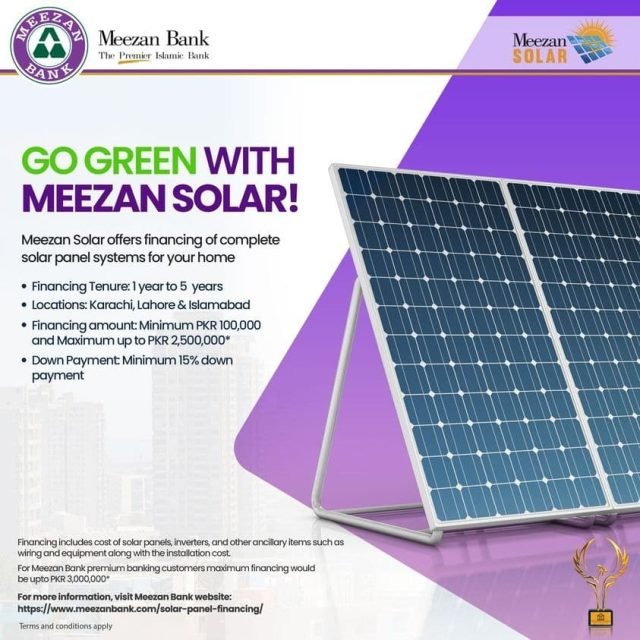Meezan Bank has begun providing its clients with Shariah-compliant advantages. They now offer the option of simple monthly installments for solar panel installations that are interest-free.
Their solar panel financing programme guarantees availability of green energy with agreeable payment schedules and reasonable costs. The installation will result in up to a 50% reduction in power costs. Additionally, as the system complies with shariah, you may install the solar panels without worrying about interest.
Also read: You Can Now Earn Rs. 10,000 for Simply Referring a Qualified Job Candidate
Solar Panel Details
The complete description of the product is given below.
| Installment plan | Monthly un-equal installments |
| Capacity allowed | 1 KW – 1000 KW |
| Financing Tenure | 1 year to 5 years |
| Rate of Profit | 1 Year KIBOR** with 2.5% for Pension and salaried income individuals. 1 Year KIBOR with 3.5% for non-salaried individuals. |
| Security collateral | 3 cheques and HPA on solar panel |
| Down Payment on On-Grid | ≥ 12 month – 15% min – 50% max. < 12 months – 30% min – 50% max. |
| Down Payment on Off-Grid | 30% min – 50% max |
| Processing charges | Rs. 5000 + FED |
Eligibility requirements:
Owners of businesses, people who have permanent jobs, people who hold temporary jobs, and people who are retired all have distinct qualifying requirements. You may learn more about eligibility on the Meezan Bank website.
The applicant must, however, own the land where the solar panel will be put. When a member of the immediate family owns the property, they will also be co-applicants.
How to Apply:
You must phone or visit the local Meezan Bank branch to apply for this facility at 111-331-331 or 111-331-332.
- Obtain a price from the energy partner of the bank. The list is accessible on the internet.
- submit the completed application form together with a copy of your CNIC and most recent power bill.
- Opening an account with Meezan Bank would be the last step.
Expenses incurred
The following expenses are related to funding.
- Solar panel cost.
- Expense for inverters.
- Cost of additional related goods, such as wiring, installation fees, and equipment.
- The price of batteries (off-grid and on-grid), net meeting that consumers must pay for, and its arrangement are not financed.









